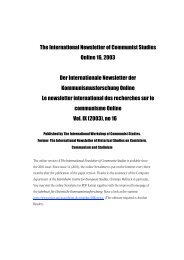VOL. XVI (2010), NO 23 - The International Newsletter of Communist ...
VOL. XVI (2010), NO 23 - The International Newsletter of Communist ...
VOL. XVI (2010), NO 23 - The International Newsletter of Communist ...
Sie wollen auch ein ePaper? Erhöhen Sie die Reichweite Ihrer Titel.
YUMPU macht aus Druck-PDFs automatisch weboptimierte ePaper, die Google liebt.
<strong>The</strong> <strong>International</strong> <strong>Newsletter</strong> <strong>of</strong> <strong>Communist</strong> Studies Online <strong>XVI</strong> (<strong>2010</strong>), no. <strong>23</strong> 83<br />
los Rios as well as the trade union leaders Daniel Anguiano (a socialist) and Angel Pestaña<br />
(an anarchist). 14 <strong>The</strong> socialist and anarchist forces in the organized trade unions were more<br />
or less equal. Both groups were supported by important regions: while the socialists<br />
dominated the workers movement <strong>of</strong> Basque Country, Asturias and Madrid, the anarchists<br />
had their “fortresses” in Catalonia. This balance <strong>of</strong> power might be the main reason for<br />
Borodin’s unwillingness to make a decision in favor <strong>of</strong> one side.<br />
<strong>The</strong>re existed no communist nucleus in Spain at that moment, and Borodin’s goal was to<br />
create such a nucleus. He started some negotiations with the militants <strong>of</strong> the Partido<br />
Socialista Obrero de España (PSOE) in Madrid who wished to affiliate with the 3 rd<br />
<strong>International</strong>, and promised them to grant “fraternal aid” as soon as the <strong>Communist</strong> Party has<br />
been founded. 15 However, the archive documents show that Borodin did not expect the CP<br />
to appear immediately.<br />
On January 4, 1920, the Soviet emissary sent a report on the activities he had carried out to<br />
the head <strong>of</strong> the Amsterdam Bureau <strong>of</strong> the Comintern. “Things look very bright indeed”, he<br />
wrote: “<strong>The</strong> Mexican Socialist Party, now the <strong>Communist</strong> Party, has declared for the Third<br />
<strong>International</strong>. In Cuba a <strong>Communist</strong> Section has been organized. In both these places great<br />
enthusiasm is displayed. Also, in Mexico a bureau has been formed for the purpose <strong>of</strong> calling<br />
a Latin American Congress, delegates to come from North, Central and South America and<br />
from the West Indies”. 16<br />
In the same report Borodin began to describe the situation in Spain as he saw it: <strong>The</strong><br />
congress <strong>of</strong> the “Federation <strong>of</strong> Socialist Youths, […] by an overwhelming majority has<br />
declared for the Third [<strong>International</strong>]. As to the Spanish Socialist Labor Party the situation is<br />
different. At the congress <strong>of</strong> the party the Old Guard succeeded […] in creating a fiction,<br />
which, like all fictions is very attractive to children. – We are not going to join the second<br />
[<strong>International</strong>], was the tenor <strong>of</strong> it. […] We shall tell the ‘revolutionary elements’ <strong>of</strong> the Second<br />
[<strong>International</strong>] to follow us to the Third [<strong>International</strong>], and if they refuse we shall tell them<br />
what we think <strong>of</strong> them and depart for Moscow. Very dramatic, is it not?” 17<br />
<strong>The</strong> Soviet emissary observed many militants <strong>of</strong> the Socialist Youth who believed this story,<br />
although they had voted for the affiliation with the Comintern. He was quite sure that the<br />
underlying motive for such thoughts was “the desire <strong>of</strong> the Left Wingers to maintain unity <strong>of</strong><br />
the party at all costs” together with the left wingers’ isolation from international connections:<br />
they “have not heard anything from the Bureau <strong>of</strong> the Third [<strong>International</strong>]. All they ever<br />
received (and that came indirectly) was the Manifesto [<strong>of</strong> the First Congress <strong>of</strong> the<br />
Comintern], which they published and which gave them some ground to stand on”. Borodin<br />
saw the lack <strong>of</strong> material resources as the left wingers had no press <strong>of</strong> their own and “no<br />
organization <strong>of</strong> any sort to defend their policy”. <strong>The</strong> PSOE newspaper was restricting the<br />
access for the left opposition to publish their opinions and information. Another newspaper<br />
(“Nuestra Palabra”) was, in fact, dedicated exclusively to the defense <strong>of</strong> Bolshevism, but it<br />
was in no way connected with the Socialist party. 18<br />
In such a situation Borodin started to organize a bureau (or a news agency) with the purpose<br />
<strong>of</strong> “keeping in constant touch with the international situation”, and his conviction was that the<br />
14 Angel Pestaña attended the Second congress <strong>of</strong> the Comintern in 1920.<br />
15 Joaquín Maurín: Sur le communisme en Espagne. As cited in: Lazitch/Drachkovitch, Op. cit., p. 153.<br />
16 M. Borodin to S.J. Rutgers, January 4, 1920. RGASPI, 497/2/1, 1.<br />
17 Ibid., l. 1-2.<br />
18 Ibid., l. 2.














